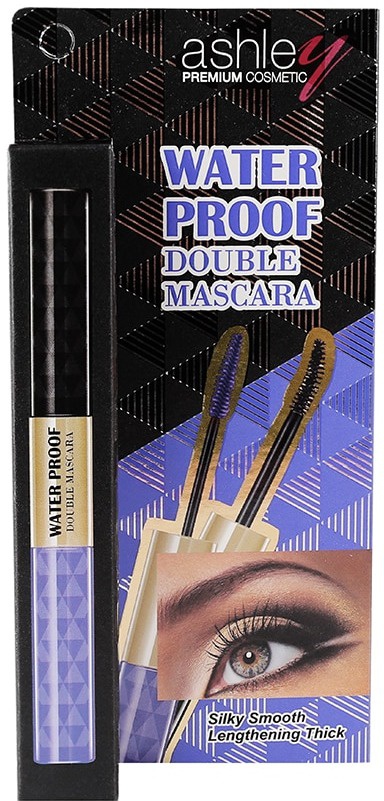
Highlights
Skim through
| Ingredient name | what-it-does | irr., com. | ID-Rating |
|---|---|---|---|
| Paraffin | viscosity controlling, perfuming | ||
| Polybutene | viscosity controlling | ||
| Silicon Dioxide | viscosity controlling | ||
| Polyglyceryl-3 Distearate | emulsifying | ||
| Propylparaben | preservative, perfuming | 0, 0 | |
| Water | solvent | ||
| BHA | antioxidant, preservative | icky |
Ashley Double MascaraIngredients explained

A white powdery thing that's the major component of glass and sand. In cosmetics, it’s often in products that are supposed to keep your skin matte as it has great oil-absorbing abilities. It’s also used as a helper ingredient to thicken up products or suspend insoluble particles.

A very common type of feared-by-everyone-mostly-without-scientific-reason parabens. It's a cheap, effective and well-tolerated ingredient to make sure the cosmetic formula does not go wrong too soon.
Good old water, aka H2O. The most common skincare ingredient of all. You can usually find it right in the very first spot of the ingredient list, meaning it’s the biggest thing out of all the stuff that makes up the product.
It’s mainly a solvent for ingredients that do not like to dissolve in oils but rather in water.
Once inside the skin, it hydrates, but not from the outside - putting pure water on the skin (hello long baths!) is drying.
One more thing: the water used in cosmetics is purified and deionized (it means that almost all of the mineral ions inside it is removed). Like this, the products can stay more stable over time.
It's the acronym for Butylated Hydroxy Anisole. It's a synthetic antioxidant that's used as a preservative.
It's a somewhat controversial ingredient: The U.S. National Institutes of Health says that BHA is "reasonably anticipated to be a human carcinogen based on evidence of carcinogenicity in experimental animals" (source: wikipedia). But, and this is a big but: these experiments were made on animals and BHA was used in high doses as part of their diet. There is no evidence that the same is true when used in tiny amounts in cosmetics products. So you probably have nothing to worry about, but if you are a better safe than sorry type there are plenty of nice products without BHA to choose from. :)
You may also want to take a look at...
| what‑it‑does | viscosity controlling | perfuming |
| what‑it‑does | viscosity controlling |
| what‑it‑does | viscosity controlling |
| what‑it‑does | emulsifying |
| what‑it‑does | preservative | perfuming |
| irritancy, com. | 0, 0 |
| what‑it‑does | solvent |
| what‑it‑does | antioxidant | preservative |






